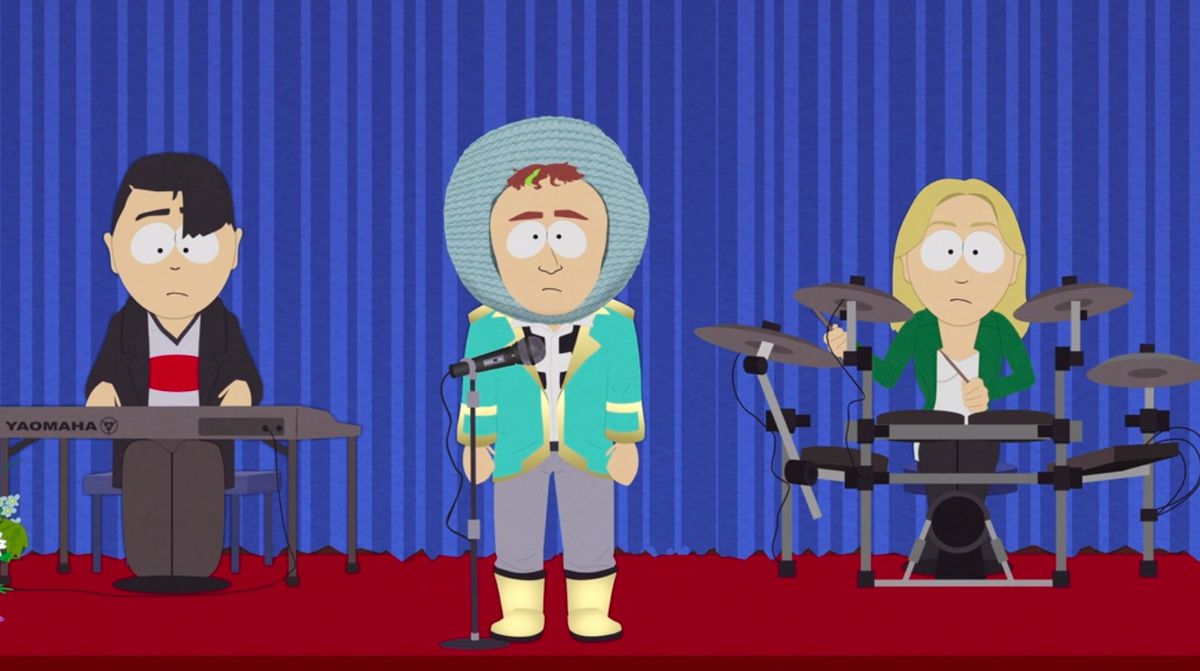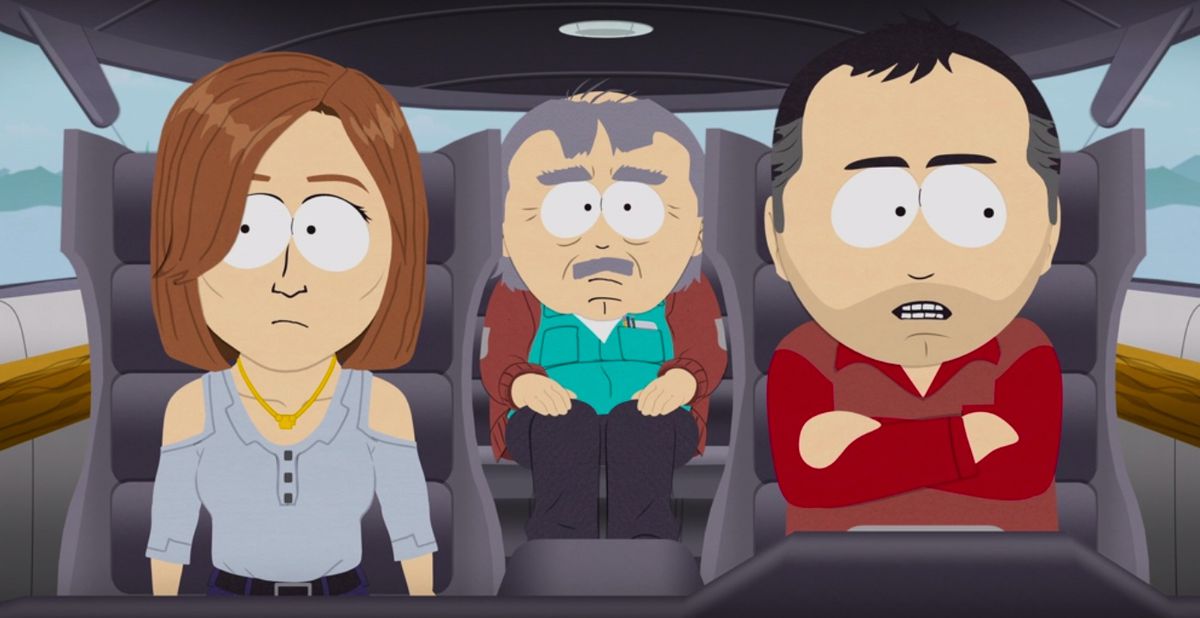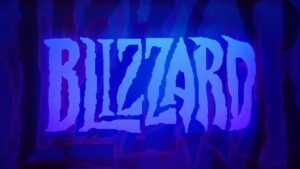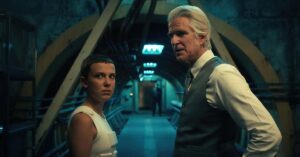“It wasn’t supposed to be like this. People were supposed to get kinder in the future,” Randy Marsh says near the end of the new special South Park: Post Covid. This is the last punch of a joke that runs throughout the entire hour-long TV movie, which is set in the year 2061.
Post Covid, now streaming on Paramount Plus, reminds the viewer at every opportunity that the movie (which, at 59 minutes, is hard to distinguish from a 47-minute special episode) is set in the future. Post Covid takes places in a world where kids stare mindlessly into VR headsets, cryptocurrency is mandatory, and doorbells sing about the future. Whenever anyone announces some societal change, like insects replacing meat on menus, they make sure to announce that it’s because they are in the future, to which Stan and Kyle remark, “I know.”

“We’re at where a lot of people are at, which is the future kind of sucks,” Post Covid writer and director Trey Parker told The Hollywood Reporter back in October. People were supposed to get kinder, but Post Covid shows a world that is very much the same. The technology may change, and some individual circumstances may change, but the world has gotten stuck in a pattern that just won’t unlodge.
Stan and Kyle (voice by Parker and co-creator Matt Stone) are at the center of Post Covid, living boring, miserable adult lives. Stan’s job as an “online whiskey sampler” gets exactly one line, and has entered into a marriage of sorts with a personified Amazon Alexa (Delilah Kujala) who mainly yells at him to stop being so pathetic while also letting him know about great deals on headphones.
Kyle’s life isn’t quite as sad, but he doesn’t seem to have accomplished anything either. The only two people from the South Park gang that really moved on from their petty childhood feuds seem to be Cartman and Kenny. Cartman has, against all odds, become an Orthodox rabbi. Kenny has become a famous scientist, traveling the world and bettering humanity. Until, that is, in what certainly won’t be a spoiler for anyone who has watched South Park before, he dies.

It’s Kenny’s death that drives the plot of Post Covid, but in many ways the main showcase here are the jokes. If you don’t like one joke in Post Covid, another comes along in five seconds. If a joke about the supposed popularity of woke comedy seems hacky, don’t worry: in a few seconds you’ll be hearing about how unvaccinated people are selfish. And if that pisses you off, then there will be a joke about how masks look like diaper chins.
Parker and Stone are tremendous maximalists, blowing out any situation to its logical endpoint. This leads to a lot of Post Covid’s stronger jokes, like every store having a “Plus” or “Max” at the end of their names, promising more and more outside while offering the exact same crap inside. It’s also quite cathartic seeing Zoom’s headquarters burned to the ground, in anticipation of the ever-just-around-the-corner final defeat of the coronavirus.
At times, it can feel like throwing jokes against a wall and seeing what works. Did Cartmen convert to Judaism to mess with Kyle, or did he actually find a good Jewish woman in Yentl (Mona Marshall)? Maybe some of both? And even if that’s the case, what does Kyle owe to other Jews? It’s a funny concept that isn’t explored enough beyond children named Moishe, Menorah, and for some reason, Hakim, plus some poorly pronounced Hebrew.
Cartman’s best gags, like pretending to be a robot named A.W.E.S.O.M.-O 4000, have always been elaborate to the point of absurdity. Would he really devote 40 years of his life and a family to messing with Kyle? Instead of watching that play out, the audience is whisked to Randy Marsh’s old age home for Blade Runner gags and a hunt for a strain of marijuana that could end the Covid pandemic.
Many of the blink-and-you-miss-them gags in Post Covid are funny, and seeing the kids’ future professions is clever. But none of the arcs in the special really settle, perhaps because unlike the first South Park movie, Bigger, Longer, and Uncut, it’s a two-parter. (The second half of the special currently does not have a release date.) And Post Covid is the first of Parker and Stone’s 14-movie deal with Paramount Plus, so the duo are in no rush to offer the same narrative structure that their first movie offered.
Bigger Longer and Uncut very much wanted to be a movie musical, from the Oklahoma-eqsue “Uncle Fucka” to the Music Man-like, Oscar-nominated “Blame Canada.” Post Covid feels more like a long, experimental episode. The opening scrawl, where a narrator pokes fun at the uncertainty of how to label the project, speaks to the confusion about what Post Covid should actually be.
All that’s determined by the end is that the boys should be friends again, and that’s good enough for now. Regardless of format, parts of South Park will always work. The ripped-from-the-headlines gags will come and go, but the shit-stirring friendship between the boys will always be what anchors the best parts of South Park.
Source: https://www.polygon.com/22803478/south-park-post-covid-review-paramount-plus
- Alexa
- All
- Amazon
- amazon alexa
- Announces
- audience
- BEST
- case
- change
- Children
- Comedy
- confusion
- content
- Coronavirus
- Covid
- cryptocurrency
- deal
- Deals
- DID
- Director
- e
- Elaborate
- Endpoint
- family
- First
- format
- Friendship
- fun
- funny
- future
- Gang
- good
- great
- headphones
- here
- Hollywood
- Home
- How
- How To
- HTTPS
- Humanity
- IT
- Job
- kids
- lead
- Line
- Long
- marijuana
- Masks
- May
- Meat
- movie
- names
- Near
- offer
- offering
- Opportunity
- Other
- P
- pandemic
- Pattern
- People
- play
- Plus
- Polygon
- project
- punch
- rush
- s
- set
- So
- South
- store
- streaming
- Technology
- The
- the world
- tv
- Voice
- vr
- VR Headsets
- W
- What
- WHO
- Wikipedia
- woman
- Work
- works
- world
- writer
- year
- years
- youtube











